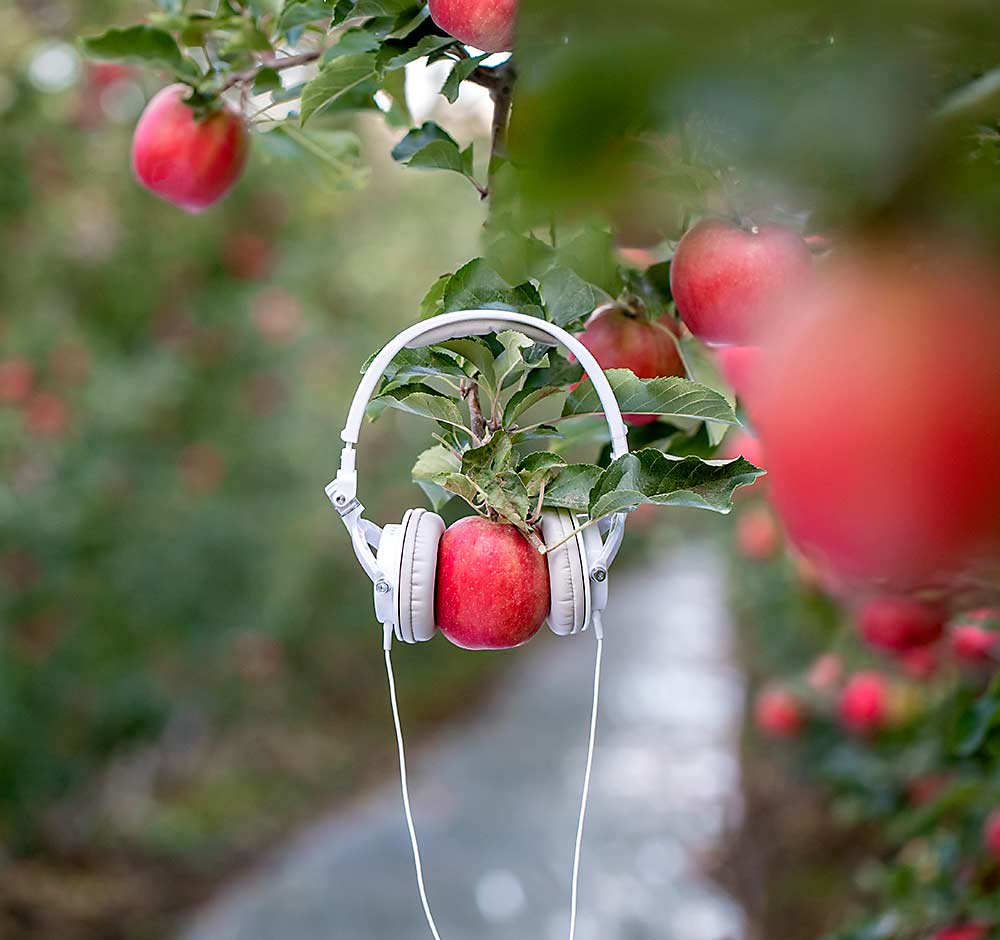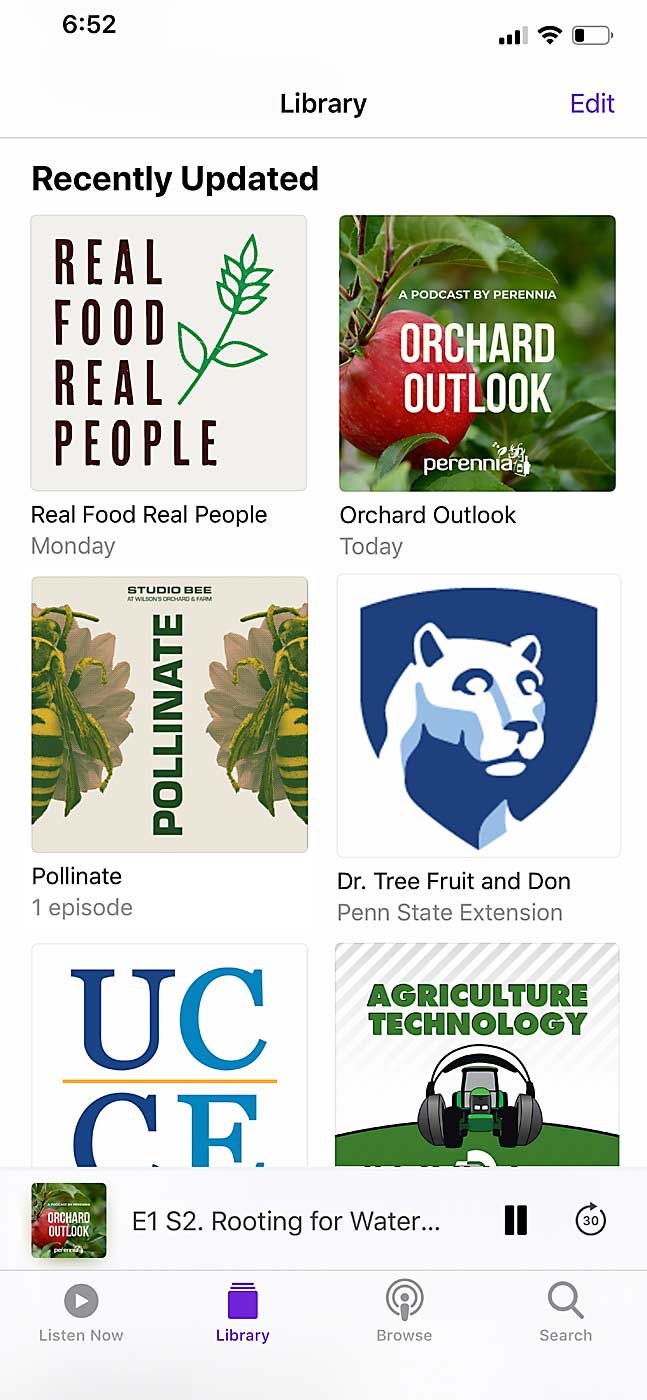
Farmers spend a lot of time in the truck or in the tractor.
That time, in the midst of a busy growing season, looks like an opportunity to extension specialists, a crop of whom are now producing podcasts as a new avenue for their mission to keep industry members informed.
“It’s not something they have to sit down and watch; they can just plug in headphones in the tractor and listen,” said Michelle Cortens, tree fruit specialist with Nova Scotia’s provincial development agency, Perennia, of her podcast “Orchard Outlook.” “It’s just about being open to the tree fruit community and sharing information.”
She invites an expert on a topic relevant to the orchardists she serves for an in-depth conversation that anyone with a smartphone can drop in on, or they can listen online. Her local growers tell her they like the format because they feel like part of the conversation.
For University of California Extension farm advisors Luke Milliron and Phoebe Gordon, a shared enthusiasm for podcasting led them to start their own, “Growing the Valley,” in 2018. They view it as another tool in their outreach toolbox.
“One of the things I really like about this as an extension format is we interview the experts. It allows us to get information out to people we think is important, even if we don’t have expertise in it,” Gordon said. “We’re podcasting for people who enjoy podcasts. It’s just a different way to receive information.”

But wait, you ask, what is a podcast?
“It’s personalized talk radio. It’s like talk radio about whatever super-specific interest you have,” said Dillon Honcoop, a radio reporter turned family farm advocate from Whatcom County, Washington. He produces a podcast called “Real Food Real People,” which aims to introduce food consumers to farmers and rebuild trust in the food system.
Download a podcast app on your phone and you can browse thousands of audio shows on news, politics, sports, humor and, oh yes, agriculture, where producers post new episodes for listeners on a regular basis. Subscribe to the ones you find interesting, and the new episodes will download for you as they are released.
Unlike radio for the masses, podcasts allow people to target niche interests — like orchard management in Nova Scotia or California’s Central Valley, or the intersection of agriculture and technology.
“Because the podcast world allows a single person to connect with people far and wide, it has really changed the game,” Honcoop said. Connection and conversation is what he strives for in the podcast he produces with the support of his employer, Save Family Farming. Podcasts allow farmers to share their passions, struggles and triumphs in a relatable way, and to combat the misinformation that makes people distrust their food and its producers. “We just felt it was really important to show that humanity and reconnect our food system,” he said.
Interest in the format for entertainment and education has been growing in recent years, as the proliferation of podcasts illustrates. Growers have launched shows themselves, such as fifth-generation California vegetable farmers Tim and Tyler Nuss, who host a podcast called “The Modern Acre,” in which they interview experts in ag tech, entrepreneurship, marketing and regenerative ag. Tyler Nuss, who started his career in the tech industry before coming back to the farm, said they started the show three years ago because “we found there wasn’t a great place for the next generation in agriculture to really create and consume content.”
The show provides them a chance to network and learn from industry thought-leaders and entrepreneurs, Nuss said, which benefits both their audience and their own farm.
“It’s self-serving, right, we are interviewing people we find interesting,” he said, adding that podcast conversations have led to business relationships. “The goal each week is that our listeners, no matter where they fit in the ag ecosystem, they can learn how technology is disrupting the food system.”
As Nuss’ inspiration suggests, the ag podcast crowd generally skews millennial, but certainly not exclusively.
Iowa orchardist Paul Rasch, who has worked in the apple industry for decades, launched a podcast called “Pollinate” in October, despite, like most of his generation, being a relative newcomer to the format, he said. He decided to try it at the urging of his son, the sales and marketing manager for Wilson’s Orchard and Farm, their pick-your-own orchard, restaurant, cidery and event-center businesses. It’s an extension of their social media efforts to connect to their customers and community, Rasch said, and he’s pleasantly surprised with the positive reception so far.
“The impetus for us is really to use it to let more people know what we do and to use it as a way of exploring different ideas around local agriculture,” Rasch said. Topics include news and visions for his own business, as well as value-added propositions, farm succession and stories from other farmers in the community.
Interest in the format continues to grow. Penn State Extension launched a tree fruit podcast last summer, featuring pathologist Kari Peter and extension educator Don Seifrit. Milliron and Gordon have even written a how-to guide for others in extension.
They started the show in 2018 with a focus on foundational topics for their key crops — nuts and tree fruit — and included pest control, nutrient management and precision irrigation. Now they have a library of over 100 episodes on their website where listeners can search for topics they want to learn about.
“In the first two or three years of the podcast, we were trying to hit the most important topics and really lay the groundwork and hope that our listeners come along with us” as they tackle more complex topics and emerging research, Milliron said.
But who are the listeners?
That was a tough question for University of Minnesota Extension fruit educator Annie Klodd, who hosted a podcast called “What’s Killing My Kale?” with a colleague who works with vegetable growers, covering topics across specialty crops.
“Growers said they wanted something to listen to in the tractor,” she said, “but it’s hard to tell how many people are listening to it.”
When the pandemic forced extension field days to pivot to webinars, Klodd said audience engagement was great, and it was much easier to see that they were reaching their target audience of local growers. They decided, after three seasons, to stop producing the podcast and focus on the webinar format, she said.
Podcasts won’t be the right learning format for everyone, Milliron said, but enough people enjoy them to make it a valuable part of his extension work. Cortens, from Nova Scotia, agreed.
“I really like the in-depth explanations that researchers can provide,” she said, citing an example of when she interviewed Peter from Penn State, who explained that fungicides can’t cure a summer rot infection because they stop spore germination, which has already happened by then.
“If you understand the science behind it, you can make a better decision,” she said. “In day-to-day conversation, we don’t always get that deep into why we are doing things.”
Hear here
Podcast curious? We recommend:
—From Perennia’s “Orchard Outlook,” the “Microscopic Meddlers” episode, featuring soil scientists Kevin Fuller and Tom Forge from Agriculture and Agri-Food Canada, and the “Downloading Decisions” episode, in which Jon Clements from University of Massachusetts, Amherst, shares apps that can help fruit growers.
—“Real Food Real People” episode 14, featuring cherry and apple grower John Griggs, and episode 20, featuring Chad Kruger, new director of Washington State University’s Tree Fruit Research and Extension Center in Wenatchee.
—“The Modern Acre” episode 72, on drones for orchard monitoring, and episode 93, on building a farm business, including a new life for an old orchard.
—“Growing the Valley” from UC Extension features a series on precision irrigation management.
—“Dr. Tree Fruit and Don” from Penn State Extension offered winter pruning tips in a recent episode.
—by Kate Prengaman






Leave A Comment